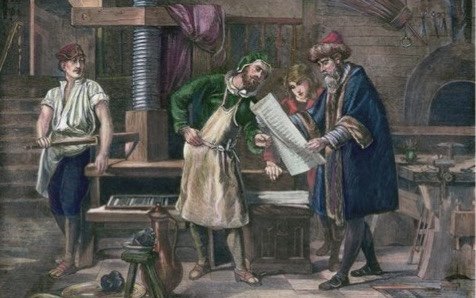Disinformation, misinformation and you
Note to my Yarns from the Farm readers—this is another in a new series for our local newspaper. I hope you enjoy it. Nan
Image: An artist's visualisation of Johannes Gutenberg in his workshop, showing his first proof sheet.
Those who control the megaphone control the message. In the days before Gutenberg invented the first printing press, even the Bible was only available to those who could read Latin and had access to precious hand-copied versions. While printing revolutionised access to the text of original documents, people still had learn to read if they wanted to make their own judgements about the truth, rather than be swayed by the rhetoric of others.
Fast forward six centuries, and we have an astonishing range of ways to get information. But the issue of figuring out who and what to believe has only gotten more challenging. Ultimately, it will be up to each of us to find and recognise truth in the face of deliberate or accidental deceit.
Over the last couple of weeks, there has been a lot of press time given over to controversy around a popular podcast, whose host regularly invites purveyors of disinformation onto his show, without challenging them or giving his listeners independent information to help them discover the validity of the claims that are made.
Should the podcasting parent company silence the host? Should they directly monitor the content and remove misleading or false information? Even if they try, the content will likely move to another platform—eg a website or youtube. And there is the larger ethical question of who gets to say what information is allowable in the public domain. When does preventing harmful lies turn into censorship?
Let’s take a look at a recent claim from one of the podcast’s visitors, Robert Malone. Among a whole list of false claims he made was this old chestnut: hydroxychloroquine and ivermectin are effective COVID-19 treatments.
This has been debunked any number of times since the first year of the pandemic. From the healthfeedback.org website: ‘Large-scale, randomized controlled clinical trials showed no benefit of either hydroxychloroquine or ivermectin for preventing or treating COVID-19.’
Malone raised the claim again in the context of a case study in the state of Uttar in India showing a correlation between reduced deaths from COVID-19 after the local government approved use of ivermectin.
So, first, question everything: does correlation imply cause? No. Disentangling causation from imperfect data is a fundamental challenge for science, and correlation is never enough to prove cause. ‘Many other factors, including immunity from previous infection, vaccination, and lockdowns, likely helped reduce the number of cases in Uttar. ’ (quote from healthfeedback.org)
Second, be objective: just because these drugs are used to treat other conditions in humans (as well as livestock), doesn’t mean they will be helpful, and may even be harmful, when used incorrectly in humans.
Third, look critically: is there any indication that a disease caused by a virus is likely to respond to a medication used to treat intestinal parasites (ivermectin) or malaria (hydroxychloroquine)? Possible, but certainly a claim to be examined closely.
Fourth, find sources you can trust to discuss the claim. For health-related claims, I have found https://healthfeedback.org/ to be an excellent resource.
Fifth, take into account the reliability of the source: who benefits from making this claim? The podcast host is paid handsomely for his work, and the more listeners he can attract the more glory (and wealth) accrues to him.
Malone’s story is a bit more nuanced. After working in the field of gene transfer as a graduate student, Malone ‘dropped out of graduate school in 1988, just short of his Ph.D., and went to work at a pharmaceutical company called Vical. Now he claims that both the Salk Institute [where Malone was a graduate student] and Vical profited from his work and essentially prevented him from further pursuing his research… It’s only in the curious world of fringe media that Malone has found the platform, and the recognition, he’s sought for so long.’ (quotes from The Atlantic, August 2021 article by Tom Bartlett.)
Neither the wildly popular podcast host nor the bitter, lapsed scientist is acting in your best interests. You need to do the work yourself to figure out the truth.

